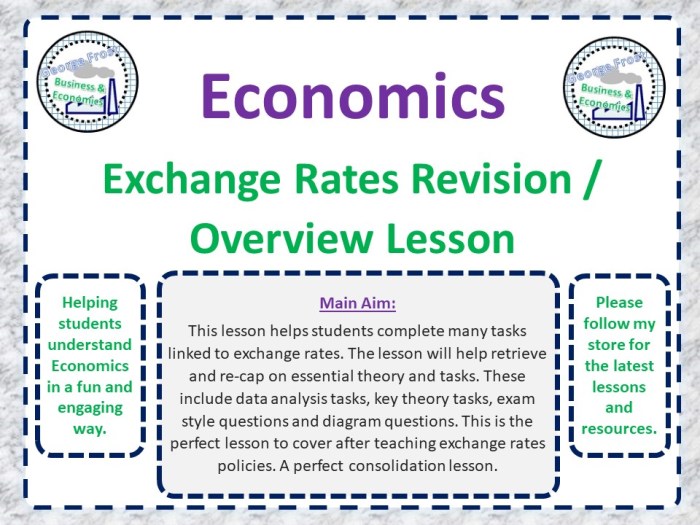The exchange rates webquest and practice answer key is an invaluable resource for understanding the complexities of currency conversion and its impact on international trade and business. This comprehensive guide provides a wealth of information, interactive activities, and practical exercises to enhance your knowledge and skills in exchange rate management.
Throughout this guide, we will explore the fundamental concepts of exchange rates, their significance in global commerce, and the factors that drive their fluctuations. We will embark on a webquest that delves into real-world scenarios and challenges your understanding of exchange rate conversion techniques.
Additionally, we will provide a practice answer key to reinforce your learning and ensure your mastery of this essential topic.
Exchange Rates: Definition and Importance

Exchange rates are the prices at which one currency can be converted into another. They are essential for international trade, as they determine the cost of goods and services imported and exported between countries.
Exchange rate fluctuations can have a significant impact on businesses and economies. Factors that influence exchange rate fluctuations include economic growth, interest rates, inflation, and political stability.
WebQuest on Exchange Rates

Learning Objectives
- Understand the concept of exchange rates and their importance in international trade.
- Identify factors that influence exchange rate fluctuations.
- Apply exchange rates to real-world scenarios.
Key Concepts, Exchange rates webquest and practice answer key
- Exchange rates
- Currency conversion
- Factors influencing exchange rates
Website Recommendations
- International Monetary Fund: https://www.imf.org/external/datamapper/NGDPDPC@WEO/ADVEC/WEOWORLD/CHN/CHN
- XE Currency Converter: https://www.xe.com/currencyconverter/
Practice Answer Key for Exchange Rates: Exchange Rates Webquest And Practice Answer Key
| Scenario | Expected Answer | Calculation Method |
|---|---|---|
| Convert 100 USD to EUR, with an exchange rate of 1 EUR = 0.85 USD | 117.65 EUR | 100 USD x 0.85 EUR/USD |
| Convert 500 GBP to JPY, with an exchange rate of 1 JPY = 0.0075 GBP | 66,666.67 JPY | 500 GBP x 0.0075 JPY/GBP |
Exchange Rate Conversion Techniques
Online Currency Converters
Online currency converters, such as XE Currency Converter and Google Currency Converter, provide a quick and easy way to convert currencies using real-time exchange rates.
Manual Calculation
To manually calculate the exchange rate conversion, multiply the amount of currency you want to convert by the exchange rate.
For example, to convert 100 USD to EUR with an exchange rate of 1 EUR = 0.85 USD, the calculation would be:
100 USD x 0.85 EUR/USD = 117.65 EUR
Impact of Exchange Rates on Businesses
Positive Effects
- Increased exports when domestic currency is weak.
- Lower import costs when domestic currency is strong.
- Improved competitiveness in international markets.
Negative Effects
- Reduced exports when domestic currency is strong.
- Higher import costs when domestic currency is weak.
- Currency fluctuations can increase uncertainty and risk.
Mitigation Strategies
- Hedging contracts
- Diversifying revenue streams
- Setting up operations in multiple countries
Exchange Rate Forecasting and Predictions
Exchange rate forecasting is crucial for businesses engaged in international trade, as it helps them mitigate risks and make informed decisions.
Methods
- Technical analysis: Using historical exchange rate data to identify trends and patterns.
- Fundamental analysis: Considering economic and political factors that influence exchange rates.
- Econometric models: Using statistical techniques to predict exchange rates based on historical data and economic indicators.
Tips
- Consider multiple forecasting methods.
- Monitor economic news and events that may impact exchange rates.
- Use reputable sources for exchange rate forecasts.
Exchange Rate History and Trends
Exchange rates have fluctuated throughout history, influenced by economic, political, and social factors.
Key Events
- Bretton Woods Agreement (1944): Establishing fixed exchange rates against the US dollar.
- Nixon Shock (1971): Ending the gold standard and allowing exchange rates to float.
- Plaza Accord (1985): Agreement to depreciate the US dollar against the yen and Deutsche mark.
Implications for Forecasting
- Historical trends can provide insights into future exchange rate movements.
- Major events can disrupt historical trends and create new exchange rate patterns.
- Understanding historical exchange rate data can improve the accuracy of forecasting models.
Popular Questions
What are exchange rates?
Exchange rates are the prices of one currency in terms of another currency. They determine how much of one currency is required to purchase one unit of another currency.
Why are exchange rates important?
Exchange rates are crucial for international trade and investment. They impact the prices of imported and exported goods, as well as the value of foreign investments.
What factors influence exchange rate fluctuations?
Numerous factors influence exchange rate fluctuations, including economic growth, interest rates, inflation, political stability, and global demand for currencies.
How can I convert currencies using exchange rates?
Currency conversion can be done manually using the exchange rate or through online currency converters. The formula for conversion is: Amount in Foreign Currency = Amount in Home Currency x Exchange Rate.
How can businesses mitigate exchange rate risks?
Businesses can mitigate exchange rate risks through hedging strategies, such as forward contracts, options, and swaps. These instruments allow businesses to lock in exchange rates for future transactions.